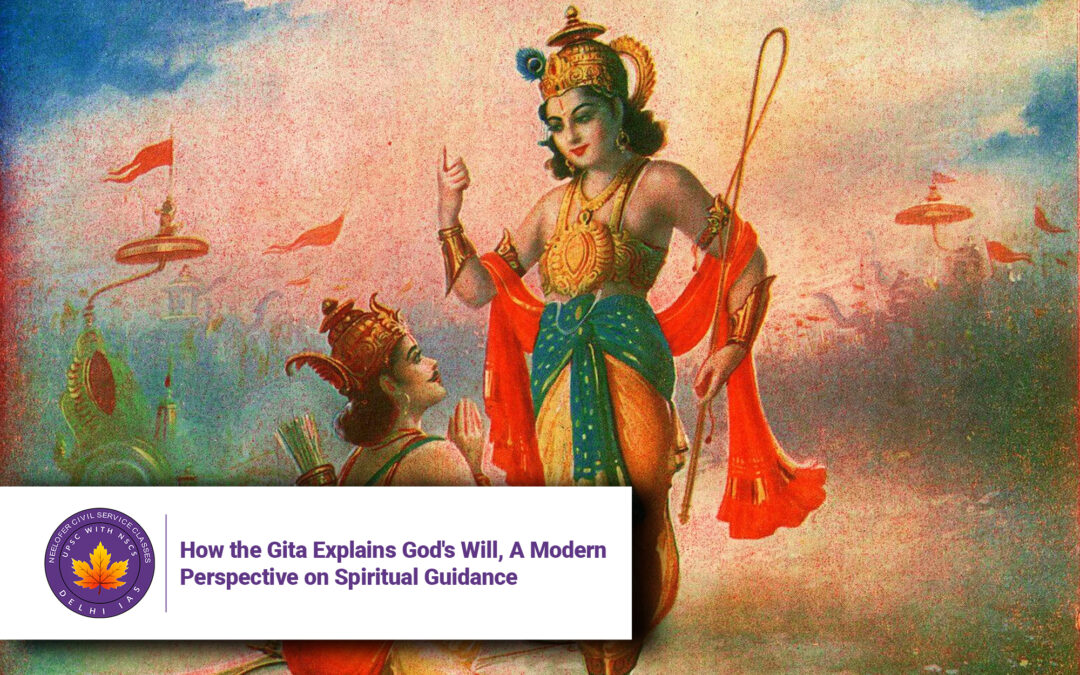How the Gita Explains God’s Will, A Modern Perspective on Spiritual Guidance
Why in News
The teachings of the Bhagavad Gita continue to resonate across generations, offering timeless wisdom on how to balance life’s challenges, responsibilities, and spiritual pursuits. A recent thought-provoking column by Ajit Kumar Bishnoi in The Pioneer highlighted how the Gita explains God’s will and why taking shelter in divine guidance is essential for managing life effectively. This has sparked discussions on how ancient scriptures remain relevant in contemporary times, especially when individuals face uncertainty, stress, and the constant search for purpose.
Introduction
The Bhagavad Gita, often referred to as the “Song of God,” is one of the most profound philosophical texts in the world. It not only addresses existential questions but also provides practical guidance for living a purposeful and disciplined life. The essence of the Gita lies in understanding God’s will—how it governs creation, sustains balance, and guides individuals toward dharma (righteousness).
Ajit Kumar Bishnoi’s interpretation underscores that God operates through His iccha shakti (will power), ensuring the continuity of creation in alignment with dharma. This understanding is not merely theoretical; it provides a framework for personal transformation, inner peace, and resilience. The article stresses that God’s guidance helps individuals identify their faults, reform themselves, and ultimately experience sukha (true happiness) beyond mere sense pleasures.
In today’s rapidly changing world, where stress, anxiety, and confusion dominate human lives, the Gita’s message of surrendering to God’s will becomes highly relevant. The column emphasizes that through reliance on divine strength, one can lead a more secure, disciplined, and fulfilling life.
Key Issues and Background
The discussion raises several key points:
-
Sustaining Creation through Divine Will
-
God sustains the universe not by compulsion but by His own free will, guided by dharma.
-
Lord Krishna in the Gita (3.22–3.23) states that although He has no duty to perform, He engages in action to maintain cosmic balance.
-
-
Human Role in Following God’s Will
-
Humans are considered parts of God (15.7) and must act responsibly, aligning themselves with dharma.
-
If God Himself remains engaged in action despite having no obligation, humans must also act carefully and purposefully.
-
-
Personal Reformation Through Divine Guidance
-
The author highlights how God helps individuals identify and rectify their shortcomings.
-
Although self-improvement can be painful, divine intervention makes it possible.
-
-
Security and Dependence on the Divine
-
A major challenge in life is uncertainty and insecurity.
-
Taking shelter in God ensures protection, guidance, and inner strength.
-
-
True Happiness Beyond Material Pleasures
-
The Gita differentiates between fleeting pleasures and lasting happiness (sukha).
-
True joy comes from aligning with God’s will, not indulging in material cravings.
-
-
Relevance in Contemporary Times
-
In a modern context, the Gita’s teachings act as a psychological, moral, and spiritual compass.
-
Meditation, prayer, and devotion help individuals strengthen resilience and face challenges with calmness.
-
Specific Impacts or Effects
-
On Individuals
-
People who internalize the Gita’s teachings develop resilience, clarity, and self-discipline.
-
They feel empowered by viewing themselves as instruments (nimitta) of God’s will.
-
Meditation and prayer provide mental strength and reduce stress.
-
-
On Society
-
A society where individuals follow dharma experiences less corruption, crime, and moral decay.
-
Values such as compassion, selflessness, and discipline strengthen social harmony.
-
-
On Spiritual Practice
-
Regular prayer, chanting, and meditation deepen spiritual awareness.
-
Faith in God’s will encourages people to overcome despair and maintain hope.
-
-
On Mental Health
-
Understanding God’s will acts as a powerful psychological tool against anxiety and depression.
-
Believing in divine support creates an inner shield against negativity.
-
-
On Leadership and Governance
-
The Gita’s emphasis on selfless action and dharma can guide political leaders and administrators.
-
Leaders who act without selfish motives and align with higher principles ensure justice and fairness.
-
Challenges and the Way Forward
Despite its universal appeal, applying the Gita’s teachings faces several challenges:
-
Secular Resistance: Many view spiritual teachings as outdated or irrelevant in modern life.
-
Misinterpretations: Over time, religious texts are subject to misinterpretation, reducing their practical applicability.
-
Distraction in Modern Lifestyle: Today’s fast-paced, technology-driven life leaves little room for introspection and meditation.
-
Lack of Spiritual Education: Schools and workplaces rarely emphasize the importance of dharma-based living.
Way Forward:
-
Incorporating the Gita’s teachings into educational curricula for moral and emotional development.
-
Encouraging daily practices like meditation and reflection to cultivate inner strength.
-
Promoting interfaith dialogue, emphasizing universal principles of dharma and will power.
-
Using modern platforms (social media, podcasts, digital learning) to spread authentic interpretations of the Gita.
Conclusion
The teachings of the Bhagavad Gita, as explained in the article, provide a practical framework for managing life. God’s will is not about rigid control but about guidance through dharma. By surrendering to divine will, individuals can overcome weaknesses, experience true happiness, and lead purposeful lives.
Ajit Kumar Bishnoi’s reflections remind us that whether in personal struggles, professional challenges, or societal issues, divine wisdom remains timeless. If we truly wish to manage life effectively, we must, as Lord Krishna advises, “take shelter of God and remain there.”
5 Questions and Answers
Q1. What is the central idea of the article “How the Gita Explains God’s Will”?
A1. The central idea is that God sustains creation through His will power (iccha shakti) and dharma, and individuals must align with this divine will to lead disciplined, purposeful, and happy lives.
Q2. How does the Bhagavad Gita describe God’s engagement in action despite having no personal duties?
A2. In the Gita (3.22–3.23), Lord Krishna explains that though He has nothing to gain, He remains engaged in action to maintain universal order. This teaches humans the importance of purposeful action.
Q3. How can individuals experience God’s guidance in daily life?
A3. By praying, meditating, and seeking divine help, individuals can identify and rectify their faults, gain inner strength, and stay aligned with dharma.
Q4. What is the difference between sukha (true happiness) and material pleasures according to the Gita?
A4. Sukha refers to lasting, spiritual happiness derived from God’s will, while material pleasures are temporary and rooted in desires and passions.
Q5. What steps can be taken to integrate the Gita’s teachings in modern society?
A5. The steps include including spiritual education in schools, encouraging meditation, promoting authentic interpretations, and using modern digital platforms to spread awareness.



